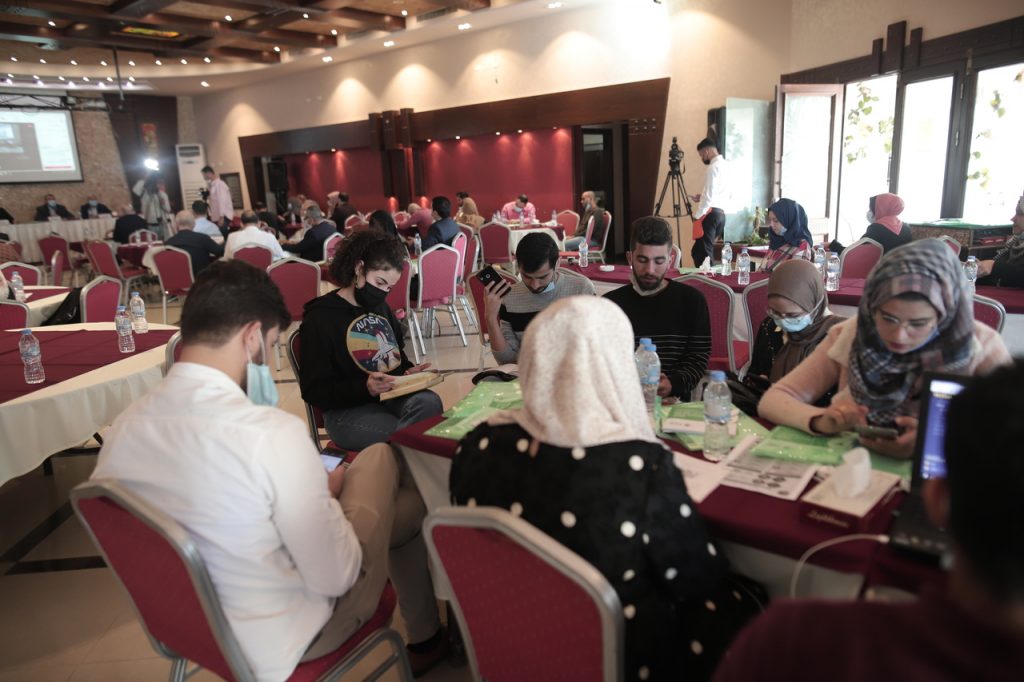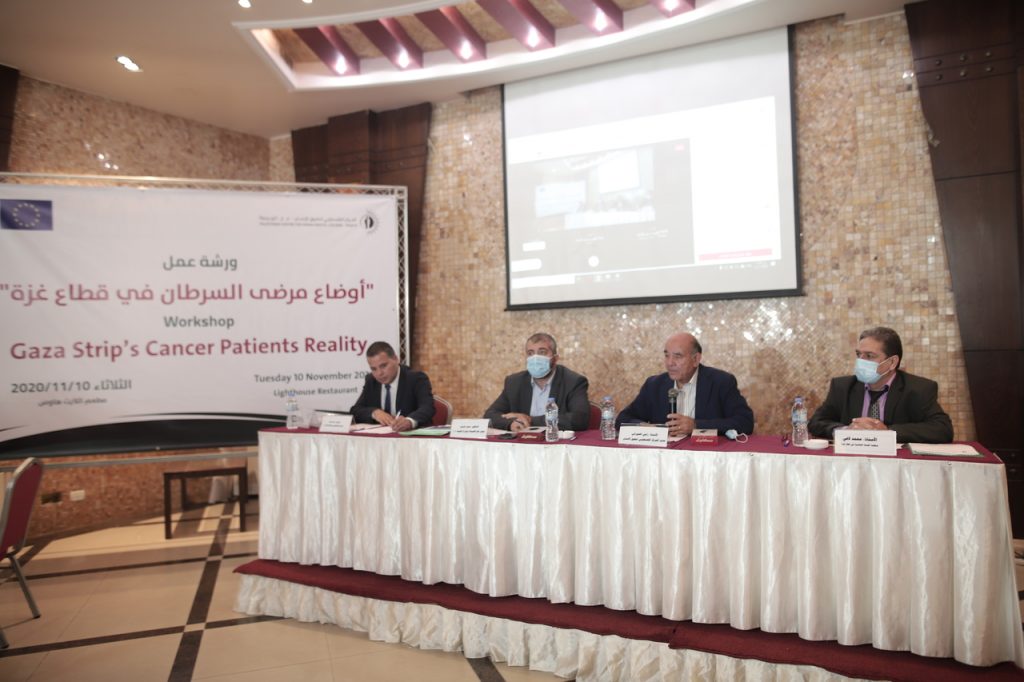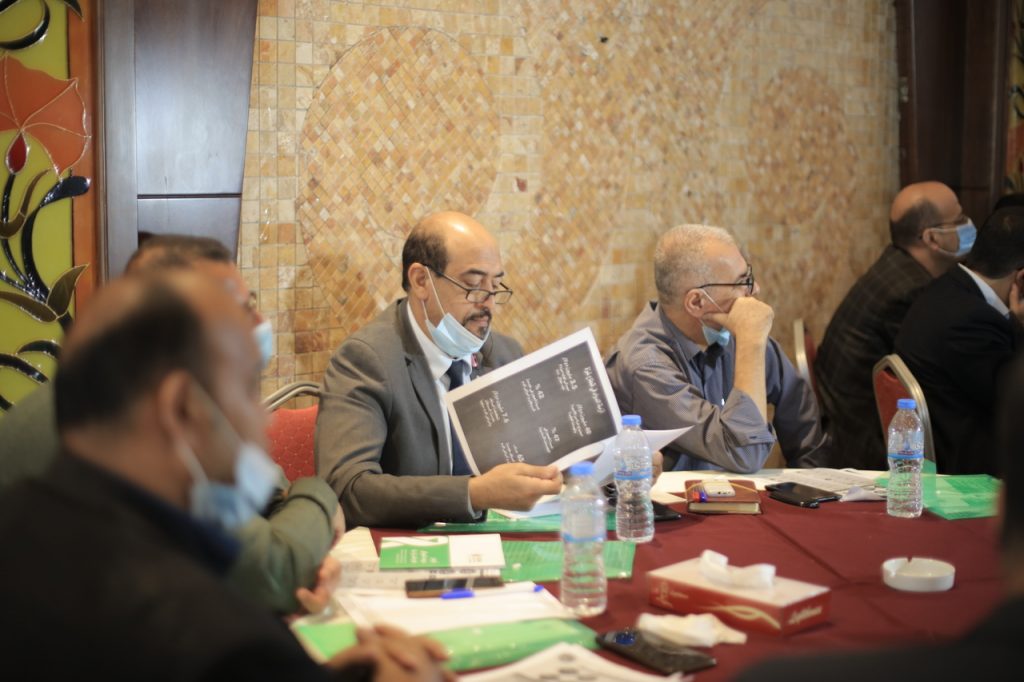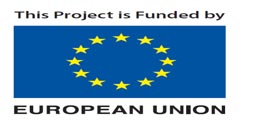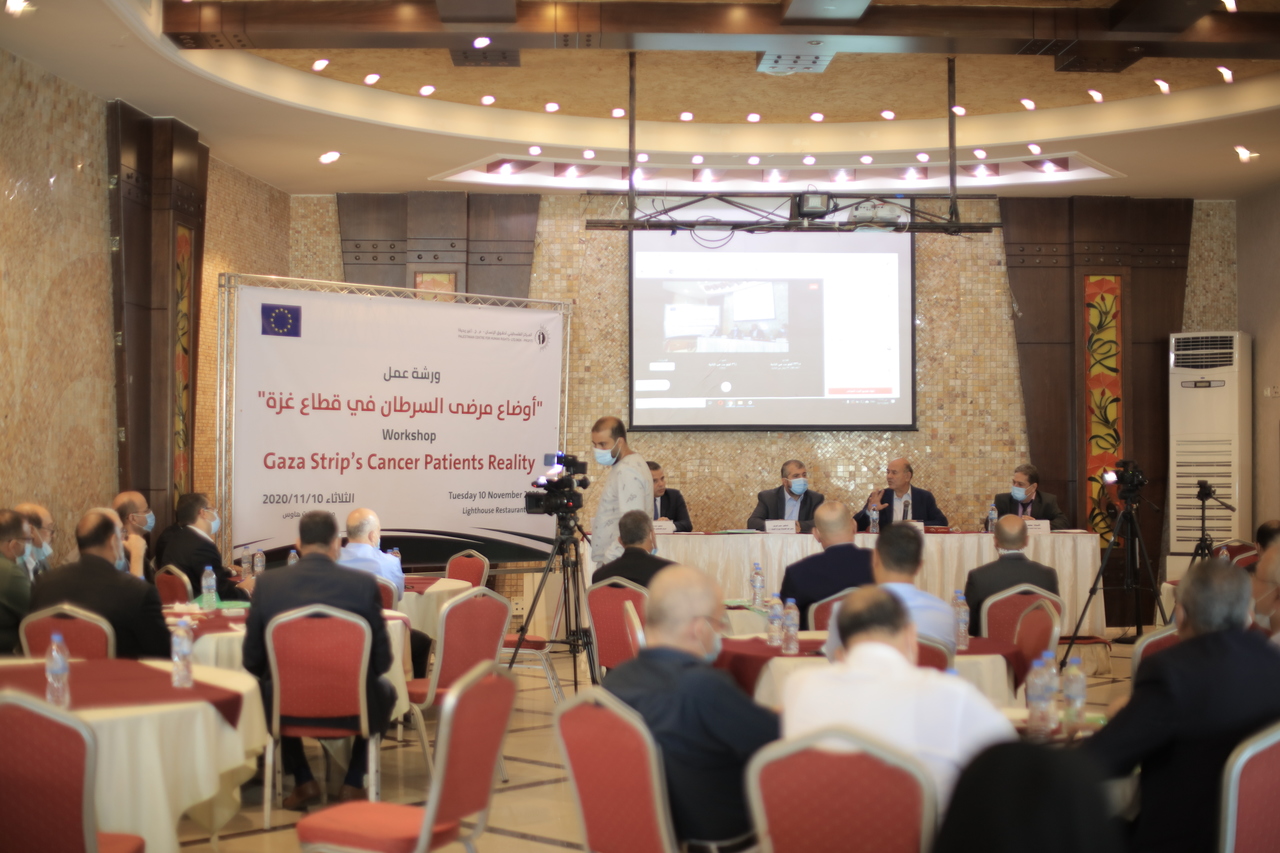
Ref: 44/2020
Date: 10 November 2020
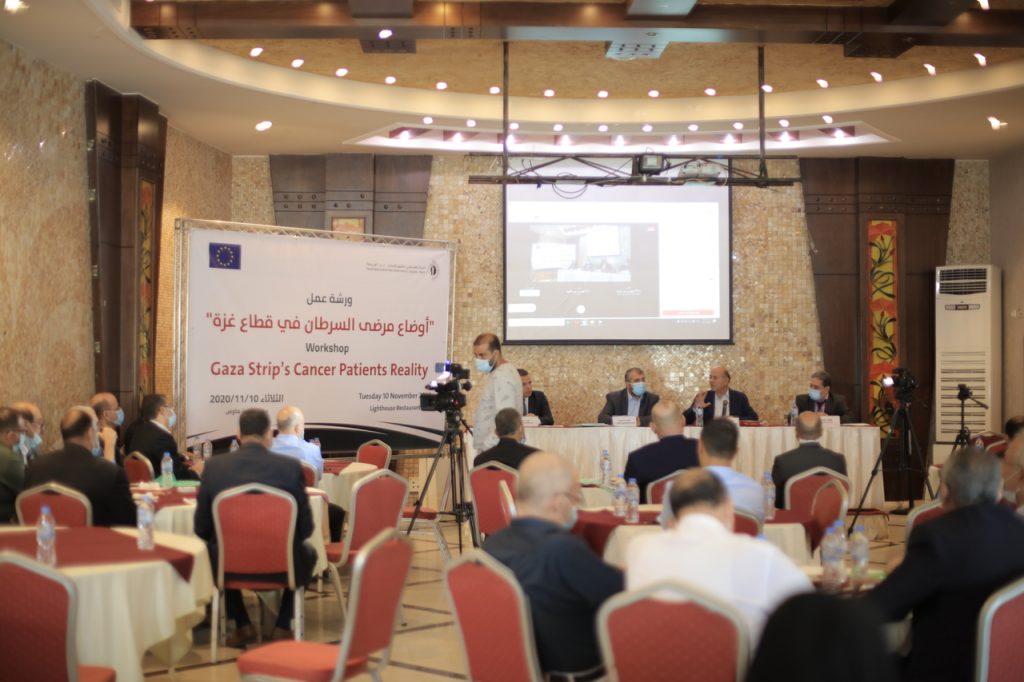
On Tuesday, 10 November 2020, the Palestinian Center for Human Rights (PCHR) organized a launching forum for its report, “The Situation of Cancer Patients in the Gaza Strip,” which addresses the cancer patients’ health conditions in the Gaza Strip in light of the restrictions imposed on their travel due to the State of Emergency and suspension of coordination between the Palestinian Civil Affairs and the Israeli occupation authorities. The Ceremony was attended by Representatives from the Ministry of Health (MOH), World Health Organization (WHO), Civil Society Organizations (CSOs) and media in addition to cancer patients and their families.
The forum was organized as part of an EU-funded project aiming to promote, respect, and fulfill the right to the highest attainable standard of health in the Gaza Strip.
Raji Sourani, PCHR’s Director, opened the forum by reviewing all legislations that safeguard the right to health and bestow full responsibility for its provision on the Israeli occupation as the obliged authority to facilitate all patients’ travel for treatment, without the Israeli-set limit to only “lifesaving cases.” Sourani added that the Palestinian internal division aggravated the health conditions in the Gaza Strip, and that out of PCHR’s legal responsibility and experience, it intervenes in many cases where patients are denied travel by the Israeli authorities (with a success rate of 60%). However, the Israeli occupation authorities’ claimed in May 2020 that PCHR would substitute to the role of the Palestinian General Authority for Civil Affairs’, the official body responsible for coordinating patients’ travel. At the time, PCHR denied the Israeli allegations and stressed that its role was limited to offering legal services and interventions for patients and is not a substitute for any entity. Sourani concluded that PCHR had thereby decided to discontinue its legal services in this regard and expressed his hope that all patients will have uninterrupted access to their right to medical treatment in accordance with existing protocols.
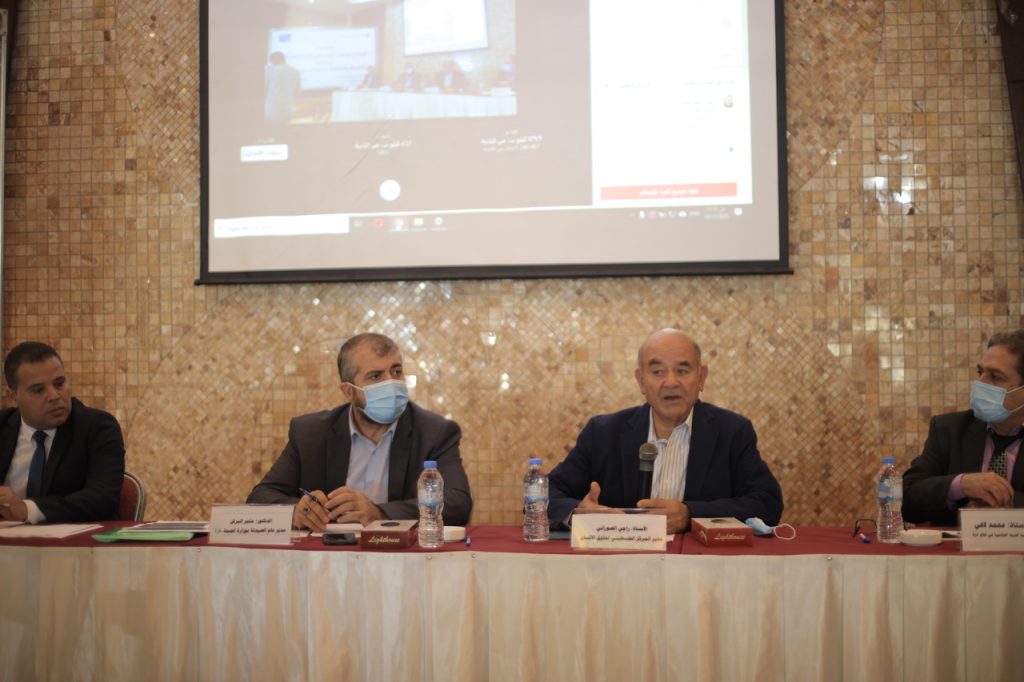
‘Azzam Shaath, PCHR researcher, presented the reports’ conclusions. The report sheds light on the suffering of 8,326 cancer patients in the Gaza Strip, particularly under a fragile healthcare system as Gaza hospitals remain unable to offer adequate treatment for all patients. He also addressed the restrictions on patients’ travel for treatment abroad, affecting cancer patients’ health and mental conditions. Shaath added that the monthly number of patients referred for treatment abroad decreased to 100 due to the state of emergency, suspension of PA’s coordination with the Israeli authorities, and the Israeli- imposed closure on the Gaza Strip.
Dr. Munir al-Borsh, Director General of Pharmacies – MOH, talked about the treatment services MOH offered to cancer patients, stating that MOH in Gaza has acute shortage in drugs essential for cancer patients (with a 42% deficit rate and cost of USD 640,000 per month.) He attributed this shortage to PA’s non-commitment to supplying drugs and medical consumables and to support the MOH-Gaza’s budget. Al-Borsh added that MOH tries to provide suitable alternatives to save patients’ lives and meet their minimum needs by coordinating with local and international health organizations which offer donations to cover MOH’s deficit.
Mr. Mohammed Lafi, Advocacy Coordinator at the World Health Organization (WHO), highlighted the WHO’s role in facilitating travel of cancer patients to alleviate their deteriorated health conditions in light of the shortage in specialized medical crews regarding treatment of cancer patients, the lack of laboratory testing devices, and the lack of a national system for early detection of cancer. Lafi stressed the danger of stopping the treatment protocols for cancer patients due to the restrictions imposed on their travel for treatment abroad. He also pointed out that about 1,700 patients applied for travel permits in 2020; yet, only a quarter obtained the Israeli authorities’ approval for travel. Therefore, the WHO had to undertake the role of obtaining the required travel permits for patients in corporation with Ministry of Health (MOH)’s Treatment Abroad Department.
Dr. Rafiq Al-Zant, Chairman of the Board of Directors of Al-Hayat Specialized Hospital, emphasized that MOH-Ramallah did not fulfill their financial commitments towards Al-Hayat Hospital with whom they contracted to provide chemotherapy treatment for cancer patients. Accordingly, the hospital suffered from accumulated financial dues amounting to NIS 50,000,000. For that reason, Al-Hayat Hospital has become unable to provide the full-service treatment for the patients, especially under the Israeli closure, aggravating patients’ suffering. Dr. al-Zant called upon the MOH to pay the financial dues it had undertaken to enable the hospital to fulfil its own financial obligations with medicine companies and provide the adequate service for cancer patients in the Gaza Strip.
Finally, Dr. Mohammed Mansour, Director of Basmit Amal Association for Cancer Care, spoke of the services provided by associations and charities specialized in cancer patients’ care in the Gaza Strip, including covering transportations and residency costs for cancer patients referred for treatment abroad as he emphasized the harsh economic conditions cancer patients endure. These associations also bare other costs such as providing psychotherapy services for patients and their families, providing wigs and breast prosthesis for female cancer patients, providing education services for out-of-school children, and the nutritional supplements for patients to help them avoid side effects of cancer.
The participants recommended that an appropriate mechanism is established to alleviate cancer patients’ suffering and to overcome restrictions imposed on them due the outbreak of the coronavirus pandemic, and to address other factors that have worsened their suffering, such as the Palestinian Authority’s suspension of coordination with Israel and the Israeli closure. The participants also put forward the recommendation to enhance coordination between the PA and civil society and international health organizations to ensure supply of devices for radiotherapy and to establish a specialized oncology center in the Gaza Strip as an alternative to medical referrals in order to cut the costs related to treatment abroad.
PCHR’s Friends Club launched the #Save_Cancer_Patients_in_Gaza_Strip hashtag during the event on social media websites. PCHR meeting was also broadcast live on PCHR’s Facebook page and it was viewed by thousands of followers. To watch the full event, please follow the link:
https://www.facebook.com/pchrgaza/videos/2758330747781142
